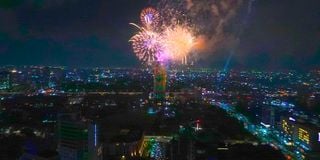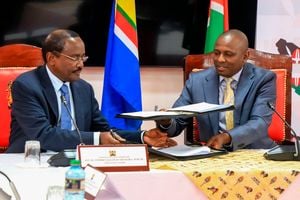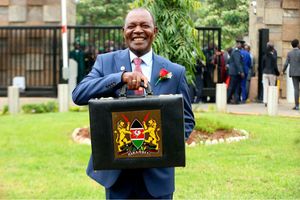
Fireworks light up Nairobi's night sky over UAP Old Mutual Tower during the New Year’s celebrations on January 1, 2024.
When I was teaching at the university before the 2022 elections, I always asked my students: "Which are the three most popular radio stations in Nairobi?"
The young students would enthusiastically pinpoint various stations that broadcasted in English.
But of course they were always wrong. Because consistently Kiswahili stations have been topping listenership in Nairobi as per credible polling companies and official government records. The first English radio station often fluctuates on position four ( in few instances breaking into number three).
But why would these students always get it wrong?
I attribute it to living in an informational bubble or echo chamber.
It is usually caused by in inbuilt "confirmation bias." That basically means a person taking positions that suit one’s own personal views and only choosing to digest information that reinforces that view.
If, for instance, you believe drinking alcohol is a good thing, you only surround yourself with persons who share such a view. You do not imagine there is a world where people do not drink. If you believe, for instance, leader X is good, you only surround yourself with persons that sing praises to him . And vice versa.
Like the above story of students at the university. Majority are young seemingly sophisticated fellows imagining a glittering legal profession they were going to join. Probably only a few could have imagined the Nairobi world that fuels those Kiswahili stations numbers - the security guards, boda boda riders, vibanda operators and mama mbogas.
Bubbles and echo chamber thinking affects all facets of the world. And always it has very dramatic effect. Often the world changes below one's feet. It is what is popularly known as “sleeping through the revolutionary." Good strategists spot these subtle changes and shepherd the new dawn.
Two examples will be given in the economic sector.
After the liberalisation of airwaves in 1990s and 2000s, the new TV stations grappled with how to win and maintain new audience. The leading private TV stations programming became too westernised, with top programming mirroring America major sitcoms.
Programmes like "Neighbours" an Australian soap opera, "Rap Em" were hot under the new liberalised world of Kenya TV audience. And indeed the advertisement sector which underwrites TV industry flocked to these stations and endorsed this western shift. The station’s marketers would enjoy high-end cocktails parties in the company of advertising firms while enjoying jazz music.
But some clever people of a struggling broadcasting entity spotted an opportunity. They inquired inwardly: do these TV programmes mirror the Kenyan reality? Do the people of Kawangware, Kibera,Dandora, Kariobangi, Eastleigh relate with these western programmes?
The new "disruptors" immediately introduced local content mirroring Kenyan reality (including off-peak Nigerian movies targeting esteemed house managers) that slowly but surely torpedoed the rest within a very short period. There has never been a catch-up.
The second example in economic sector is well known- it does not need repeating. It is in banking industry where multinationals in 1990s and 2000s pulled out from small towns and low-income areas in major urban areas. This was ostensibly because the people were too poor to efficiently sustain banking services. A Kenyan bank spotted an opportunity and flung it doors to everyone. What about confirmation bias or echo chamber or bubbles in politics? Now this tends to be worse.
Politicians could miss the shifting mood, mostly because power is very addictive and passionate. This phenomenon of bubbles and echo chamber affects both leaders and their supporters.
An example for supporters bubble is America in 2016 elections. Very few left Wing voters or known lectoral pundits believed Donald Trump would win. Before he won the Republic ticket, one top US newspaper decided to designate Trump campaign news in its entertainment segment. Until the day he actually won the presidency. But political bubbles or echo chambers affect leaders in more dramatic manners.
Peter Salasya, MP for Mumias East Constituency in Kakamega is asever green and controversial as can be. A maverick politician per excellence. In the run-up to the 2022 elections, he was set to vie on an Orange Democratic Movement (ODM) ticket. The party’s kingpin in the county was the then outgoing Governor of Kakamega Wycliffe Oparanya.
He was so powerful and popular that he would literally dish out ODM tickets and indeed whoever got his nod basically won — except in very few constituencies. And one was Mumias East. When he saw Mr Salasya coming for the ODM ticket, he just laughed and said things that ought not to be repeated in a family newspaper.
But Salasya showed them it was not a laughing matter on the elections day when he woncomfortably. Looks indeed can be deceiving. Mr Salasya did not have tonnes of money but he had "humanity " which he gave in plenty.
The phenomenon of political bubbles or echo chambers should matter more to those in leadership. Because the obvious inclination of every leader is to re-elected.
So, what is the remedy to this problem? To listen more keenly to those who say negative things about you than to those who say positive. In fact, avoid those that say positive things like the plague.
Second, assume you do not know anything. That which you know, doubt it. And there are solid reasons for doubting things that you know-nothing is ever constant or permanent i. Therefore, be on a lifelong learning and discovery journey. Third, trust decisions of the many than your own singular judgement. There is a concept called "wisdom of the crowd. " It means "the collective knowledge of a group as expressed through their aggregate action or opinions, regarded as an alternative to specialist or expert knowledge. " Finally, listen more. Learn more. Read more. Even that child or person telling you something, might be the angel that you need in 2024.
Dr Kang’ata is the Governor of Murang’a County, Email: [email protected]










